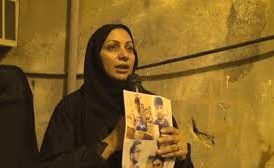31 May 2017 – On 26 May 2017, Bahraini security forces subjected human rights defender Ebtisam al-Saegh to seven hours of torture and interrogation over her activism, including her engagement with United Nations (UN) human rights mechanisms. The Bahraini government’s actions in this regard represent the latest in a series of acts of harassment and intimidation directed at al-Saegh and others that highlight the continued intensification of the government’s campaign of reprisals against human rights defenders and members of the country’s independent civil and political societies. That these moves come in the lead-up to the 35th Session of the UN Human Rights Council (HRC) is extremely worrying given the government’s record of conducting reprisals against activists participating or attempting to participate in the Council’s sessions.
Ebtisam al-Saegh is a Bahraini human rights defender who works to document human rights violations on the ground in Bahrain. On 25 May, al-Saegh received a phone call from the National Security Agency (NSA), during which she was instructed to appear at the NSA building in Muharraq the next day. After al-Saegh arrived at the NSA building on 26 May, she was blindfolded. Over the next seven hours, Bahraini security forces subjected her to physical and psychological torture. NSA officers beat her all over her body and forced her to stand nearly the entire time. According to al-Saegh, the officers beat her on her nose and her stomach in particular, knowing that she had undergone nasal surgery and was suffering from a colon condition. Bahraini authorities sexually assaulted al-Saegh and threatened al-Saegh’s daughter with rape and told her that they would torture and electrocute her husband. When authorities released her from the NSA late at night, al-Saegh could not walk properly and was ultimately taken to a hospital to receive treatment for a nervous breakdown.
Throughout her torture and detention at the NSA, Bahraini security forces interrogated al-Saegh about the government’s deadly 23 May raid on peaceful demonstrators in Duraz, other human rights defenders she knew, and her participation in previous HRC sessions. Bahraini authorities told al-Saegh that she would continue to be targeted if she did not cease all of her human rights activities.
In the weeks preceding her torture and interrogation, al-Saegh was among the numerous civil and political society actors being subjected to acts of harassment and intimidation in an apparent campaign that the Bahraini government has carried out with impunity. On 12 May, the government-backed newspaper Al Ayam ran a front-page story accusing al-Saegh of fabricating the documentation of human rights violations in the country. Days later, at dawn on 15 May, al-Saegh’s car was incinerated in a fire. The incident was one of several other suspicious car fires that the Ministry of Interior dismissed as electrical “short circuits.”
The Government of Bahrain has targeted al-Saegh for her human rights work several other times in the past. In November 2016 and January 2017, for example, Bahraini authorities summoned al-Saegh for questioning over her human rights work and about comments she made on Twitter and in television interviews. Bahraini authorities have also repeatedly subjected al-Saegh to reprisals for her engagement with UN human rights mechanisms, including the HRC. On 12 June 2016, one day before the start of the 32nd Session of the HRC, Bahraini authorities subjected al-Saegh and a number of other human rights defenders and activists to travel bans in order to prevent them from participating in the Council session. In March 2017, al-Saegh was able to travel to and participate in the 34th HRC session. While the session was ongoing, Bahraini authorities summoned al-Saegh’s sister Bassima to a local police station and questioned her about al-Saegh’s activities at the HRC. When al-Saegh herself returned to Bahrain after the HRC session, Bahraini authorities detained her for several hours, questioned her about her work, and threatened her family.
The Bahraini government’s treatment of al-Saegh is emblematic of its actions toward human rights defenders and civil and political society actors more broadly. In particular, Bahraini authorities have subjected individuals engaging with UN human rights mechanisms to reprisals with increasing brazenness. In addition to the actions directed at al-Saegh that are listed above, for example, the Government of Bahrain also imposed blanket travel bans on activists ahead of the 33rd HRC session in September 2016 and the country’s 3rd cycle Universal Periodic Review in May 2017. In addition to targeted al-Saegh’s family members during the 34th HRC session, Bahraini authorities also tortured family members of Sayed Ahmed al-Wadaei, the Director of Advocacy at the UK-based Bahrain Institute for Rights and Democracy.
The 35th Session of the HRC begins on 6 June 2017. The Bahraini government’s torture of Ebtisam al-Saegh and its continued harassment of numerous activists and civil and political society actors in the days leading up to the session must serve as a reminder to the international community of the diligence with which it must monitor the activities of Bahraini authorities throughout the Council session. If the past is any indication, reprisals against Bahraini activists participating or attempting to participate in the session seem likely to occur. This is utterly unacceptable. The HRC, the Office of the High Commissioner for Human Rights, UN Member States, and the international organizations gathered in Geneva must forcefully and condemn any such reprisals conducted by Bahraini authorities. If the international community allows the Government of Bahrain to silence the voices of independent Bahraini actors at the HRC, it will degrade the Council and represent a shameful abandonment of those continuing to strive peacefully towards human rights and democracy in Bahrain.





